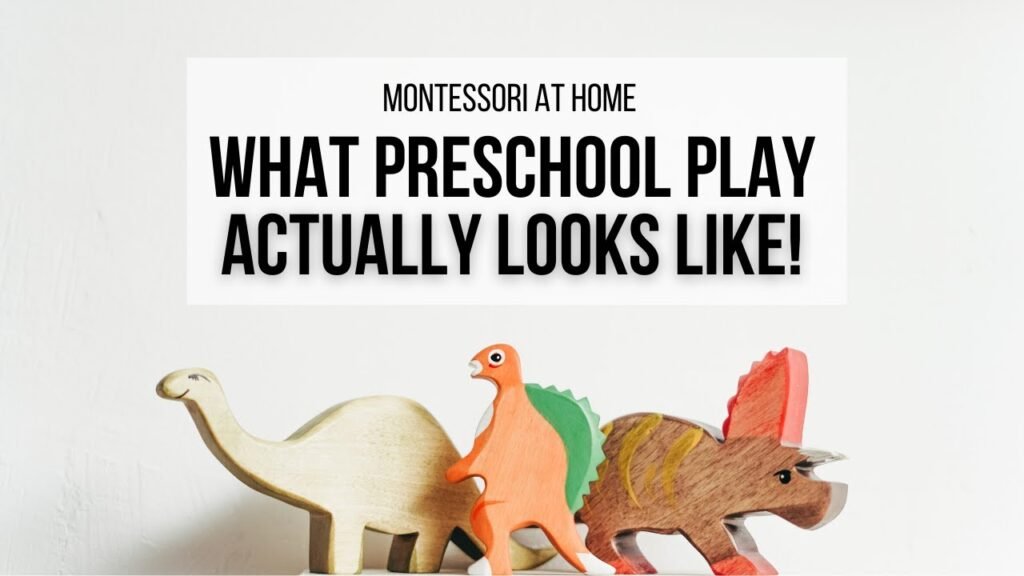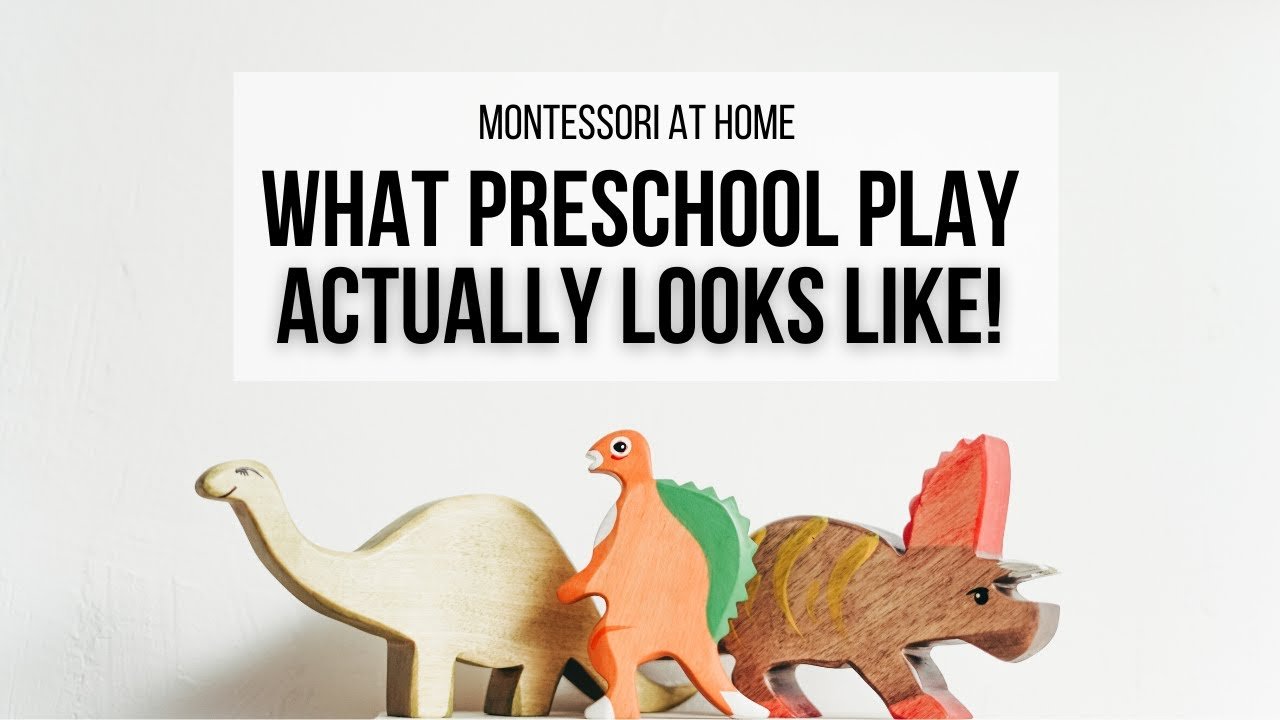Hey there! My name is Ashley, and I’m a mom of two adorable girls, Kylie and Mia. Lately, I’ve been on a journey to simplify our home by minimizing my children’s toys and books. This got me thinking about what preschool play actually looks like in a Montessori home, and I thought it would be fun to share with you all. So, let’s take a sneak peek into the world of Montessori at home and discover what preschool play really entails.
When it comes to preschoolers, play in a Montessori home focuses less on specific organized tray activities and more on different areas of play. Practical life activities like cooking, cleaning, and even flower arranging are essential domains of play. Arts and crafts, sensory play, building materials, pretend play, and reading books are also important for their development. Furthermore, gross motor play and spending time outdoors in nature are vital for preschoolers to engage with their environment and release their energy. So, join me as we delve into what preschool play actually looks like in a Montessori home!

Preschool Play in a Montessori Home
Preschool play in a Montessori home differs from what might be expected in a traditional setting. Instead of focusing on specific organized tray activities, Montessori preschoolers have domains of play, different areas of the home dedicated to various types of play. This shift in approach recognizes the developmental stage of preschoolers, where they have well-established gross and fine motor skills and are eager to explore and engage with the world around them. It is essential for Montessori parents to understand the different areas of play their preschoolers will be interested in and create an environment that supports and nurtures these interests.
Different Areas of Play
In a Montessori home, there are several key areas of play that are important for a preschooler’s development. These areas include arts and crafts, sensory play, building materials, pretend play, and reading books.
Arts and crafts provide children with opportunities to express their creativity and develop fine motor skills. Montessori-inspired activities may include painting, drawing, cutting and pasting, and exploring various textures and materials.
Sensory play engages the senses and encourages exploration. This can involve playing with sand, water, playdough, or sensory bins filled with items like rice, beans, or natural materials. Sensory play helps children develop their sensory processing skills and fosters curiosity and discovery.
Building materials, such as blocks, LEGO, or magnetic tiles, promote spatial awareness, problem-solving, and fine motor skills. Preschoolers often enjoy building towers, houses, or bridges using these materials.
Pretend play is an essential part of a preschooler’s development as it fosters creativity, imagination, and social skills. Creating a pretend play area with props like dress-up clothes, toy kitchen sets, or dollhouses allows children to engage in open-ended play and role-play scenarios.
Reading books is another vital aspect of preschool play in a Montessori home. By having a variety of books available and creating cozy reading nooks, parents can encourage their preschoolers to develop a love for reading and language skills.
Importance of Practical Life Activities
Practical life activities, such as cooking and cleaning, are significant domains of play for preschoolers in a Montessori home. Engaging in everyday tasks helps children develop independence, fine motor skills, and self-confidence.
Cooking provides an excellent opportunity for children to learn about different foods, practice measuring and counting, and develop essential life skills. Involving preschoolers in meal preparation helps them feel a sense of accomplishment and contributes to their overall development.
Cleaning activities, though not always a child’s favorite, are essential for developing responsibility and a sense of respect for the environment. Simple tasks like sweeping, dusting, or wiping surfaces can be turned into engaging games or challenges to make them more enjoyable for preschoolers.
By including practical life activities in their play, Montessori parents can instill important life skills, independence, and responsibility in their preschoolers.
Other Important Domains of Play
In addition to practical life activities, there are other domains of play that preschoolers in a Montessori home enjoy. These include music and playing musical instruments, as well as puzzles and games.
Music is a wonderful way for preschoolers to express themselves and develop a sense of rhythm and coordination. Providing musical instruments, such as drums, xylophones, or shakers, allows children to experiment with sounds and engage in musical play.
Puzzles and games are not only entertaining for preschoolers but also help develop problem-solving, critical thinking, and concentration skills. Montessori-inspired puzzles, matching games, or memory games are perfect for engaging young minds and promoting cognitive development.
Gross Motor Play and Outdoor Play
Gross motor play and outdoor play are vital for preschoolers as they allow them to expend their energy, engage with the environment, and develop physical and coordination skills.
Importance for Preschoolers
Preschoolers have an abundance of energy and an innate need for movement. Engaging in gross motor play and outdoor play allows them to release this energy while developing their muscles and coordination.
Expend Energy
Through activities like running, jumping, climbing, or riding a bike, preschoolers can burn off excess energy and engage in physical exercise. Gross motor play helps them develop strength, agility, and spatial awareness.
Engage with the Environment
Outdoor play provides preschoolers with the opportunity to explore and interact with the natural world. They can discover plants, insects, and animals, fostering a connection to nature and an appreciation for the environment.
Benefits of Gross Motor Play
Engaging in gross motor play has numerous benefits for preschoolers, enhancing physical, cognitive, and emotional development.
Physical Development
Gross motor play helps preschoolers develop their muscles, improve coordination, and increase their overall physical fitness. Activities like running, jumping, and climbing strengthen muscles and bones, promoting overall health.
Coordination and Balance
Activities that require coordination and balance, such as riding a scooter or playing catch, help preschoolers refine their motor skills and develop a better sense of balance and spatial awareness.
Strength and Endurance
Regular gross motor play builds strength and endurance in preschoolers. Through activities like swinging, swimming, or playing on playground equipment, children develop stamina and physical resilience.
Outdoor Play in Nature
Outdoor play in nature offers unique benefits for preschoolers, connecting them with the natural world and stimulating their imagination.
Connection with Natural World
Outdoor play allows children to experience firsthand the wonders of the natural world. They can observe plants, animals, and weather patterns, fostering a sense of curiosity and connection with nature.
Appreciation for Nature
By spending time outdoors, preschoolers develop a deeper appreciation for the environment and learn to respect and care for nature. They can learn about the importance of sustainability and become advocates for preserving the natural world.
Stimulates Imagination
The outdoor environment offers endless opportunities for imaginative play. Preschoolers can transform sticks into magic wands, branches into swords, or stones into precious gems. Outdoor play stimulates creativity and encourages open-ended play.
Organizing Play Materials in a Montessori Home
When organizing play materials in a Montessori home, it is essential to consider the child’s preferences and natural play tendencies.
Based on Child’s Preferences
Observing and understanding your preschooler’s interests and preferences will help you set up play areas that cater to their specific needs. Pay attention to what activities they choose independently and ensure those materials are easily accessible to them.
Consider Natural Play Tendencies
Montessori environments aim to provide materials and activities that align with children’s natural tendencies. Observing your child’s inclinations towards certain types of play can guide you in organizing materials for optimal engagement and learning.
Conclusion
Understanding what preschool play looks like in a Montessori home allows parents to create a supportive and nurturing environment for their children. By focusing on different areas of play, such as arts and crafts, sensory play, building materials, pretend play, and reading books, parents can encourage their preschoolers’ development and provide opportunities for growth.
Practical life activities like cooking and cleaning teach important life skills and foster independence. Other domains of play, such as music and playing musical instruments, as well as puzzles and games, contribute to cognitive and creative development.
Gross motor play and outdoor play are crucial for preschoolers as they promote physical fitness, coordination, and a connection with nature. Creating an organized play environment based on the child’s preferences and natural tendencies further enhances the Montessori preschool experience.
In conclusion, prioritize gross motor play and outdoor play in your home, as they offer immense benefits for your preschooler’s physical, cognitive, and emotional development. Embrace the versatility and freedom of play in a Montessori home, adapting to your child’s interests and needs. By providing a rich and engaging play environment, you are supporting and nurturing your preschooler’s growth and development.

